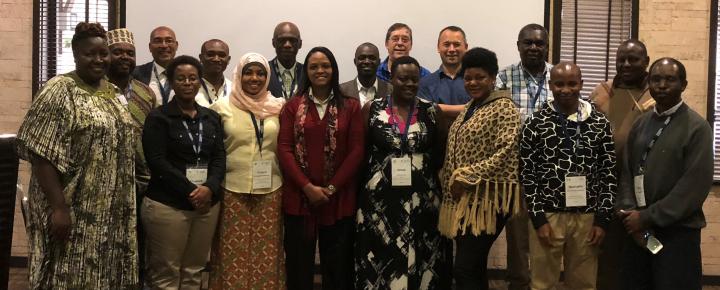Partnership for Enhanced and Blended Learning
Dr Ewan MacLeod from the Division of Infection and Pathway Medicine and the Biomedical Teaching Organisation led workshops in Nairobi, Kenya as part of the Spheir funded project Partnership for Enhanced and Blended Learning (PEBL) which is led by the Association of Commonwealth Universities.

The University of Edinburgh is one of the partners within the project along with Commission for University Education (Kenya), Commonwealth of Learning (Canada), Kenyatta University (Kenya), Makerere University (Uganda), Open University of Tanzania, State University of Zanzibar (Tanzania), Staff and Educational Development Association (UK), Strathmore University (Kenya) and the University of Rwanda.
Participants from 24 universities from Kenya, Rwanda, Tanzania and Uganda were present at the workshops. Participants discussed adoption of the PEBL courses and use of blended learning. Lorna Campbell from the university’s Information Services joined the workshops virtually to provide guidance on open education resources and creative commons licences. Dr Tony Lelliot from Saide discussed upload of material to the OERAfrica site where course material will be hosted.
The project aims to address the critical academic staff shortages many East African universities are currently facing through sharing of teaching resources delivered through blended learning. By participating in PEBL, East African universities will be able to expand the range of courses offered to students enrolled on taught undergraduate and postgraduate degree programmes, and ease the teaching burden placed on their staff. Quality assured courses, created by academics from other institutions in the region, will provide students with online teaching, combined with in-person tutoring and assessment, resulting in degree credits from their own university .
During the workshops I presented on utilising blended learning within taught courses, and also presented some of the blended learning activities that I use in our undergraduate Biomedical Sciences courses Microorganisms, Infection and Immunity and Global Health and Infectious Diseases, as well as discussing some of the online activities I do with my Postgraduate Online International Animal Health students.
It has been really inspiring listening to the teaching activities of our African colleagues and their teaching practices as they adapt their already running courses to blended learning environments.
We also gained some understanding of the problems that faculty and students are facing. This includes staff levels and access to IT equipment. Some universities have over a thousand computers for students to access, while others have ratios of one computer to 100 students. Access to course materials off site was also brought up as an issue as downloading data can be expensive. It was also interesting to hear that although laptop ownership was low, that the majority of students had smartphones and could interact through social media with their lecturers and fellow students during their lectures.

